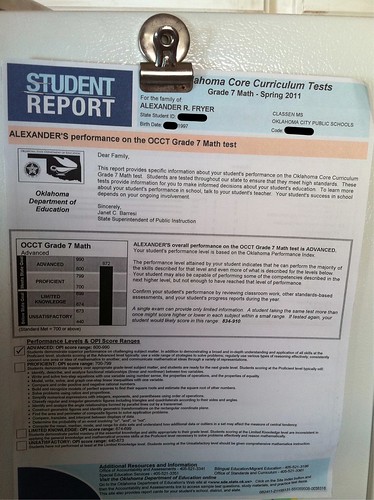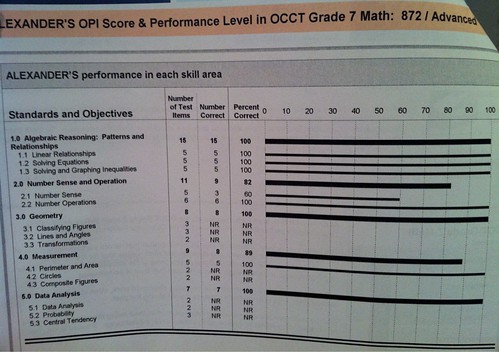As 2011 draws to a close I’m organizing, sharing, and tagging a variety of photos I took this past fall with my iPhone on Flickr. In the past at times like these I’ve tended to upload large bunches of photos and skip the process of individually labeling photos. Instead, I’ve just organized photos in sets and sometimes in collections. Photos are much more likely to have utility and value not only for me, but also for others who find them via a permissive Creative Commons license, if they have appropriate labels and tags, however. Understanding this, I’m working to “change my ways” with more specific Flickr titles and tags tonight.
Lots of these photos “beg” for a blog post, and the following two are some of the loudest contenders in that category this evening. I snapped these photos this fall when my 8th grade son brought home the results of his Oklahoma standardized math and reading tests scores from 7th grade. Yes, we (his parents) were proud of his results. Yes, we posted them on the refrigerator in our kitchen. But, there are a lot more thoughts going on here besides simplistic parental pride. There’s also confusion and frustration.
Amidst the multitude of thoughts and responses I had and still have in looking at these test scores, the following statement stands out: “Standardized test results obfuscate real learning.” Obfuscate isn’t a commonly used word, so I’ll turn to Google for a definition.
Obfuscate: verb. 1. Render obscure, unclear, or unintelligible.
2. Bewilder (someone).
To be valuable to parents, documents sent home from school (both physical and digital ones) need to catalyze meaningful conversations between kids and adults. Standardized testing results obfuscate real learning because they FAIL this basic litmus test. The quality of conversations between my son and I after he handed me these scores was qualitatively the same as caveman Og had with his son when he brought home a deer from a hunt. “You hunt good.” “Me proud.” These are not bad things to say, but they’re not intellectually very deep.
I firmly believe the testing companies and testing psychometricians who design reports like we have for the OCCT tests do them with the explicit goal of intimidating and confusing parents. The message I receive from a report like this is:
Your child is doing lots of complex things at school which are not easily explained or understood. Trust us when we say your child’s performance is X on a scale of Y. We’ve designed these results so you will understand very little of them. We specifically want to prevent you from asking intelligent and helpful questions as a result of this testing result document. This is designed as one way communication: We’re telling you what score we assign to your kid. Your job is to nod your head affirmatively when we ask if you understand these results, and then maintain a perception that your public school is doing a good job educating your child.
I detest and reject the myopic and damaging focus on high stakes testing which our politicians have mandated for our public schools. I attended a meeting in the last two weeks in which the committee chair made a statement which made my heart briefly stop: “Standardized testing is so accepted by the public, it is politically impossible for us to question it at this time.” The context of that meeting was such that if ANYONE in our state should be feeling empowered and able to question the value and utility of standardized testing, it was the members of that committee. No one questioned the chair’s statement during the meeting, however. Since I was attending over the phone, I couldn’t see anyone else’s body language in the meeting. It was a chilling moment for me. I’m not sure how it will come about, but I KNOW we (the educators in the room) have to take back the power and responsibility for designing student assessments from the politicians and the testing companies.
As you send documents home for your parents in upcoming weeks and months, ask yourself this simple question:
Can this document serve as a meaningful catalyst for important conversations between kids and adults?
If you’re a public school teacher, I know you have to send home standardized test results. I’m not asking you not to. The politicians have ordered teachers to send home these expensive pages of statistical obfuscation, and at this point there’s no getting around that.
However, we DO have opportunities to send home meaningful examples of student work which CAN catalyze important conversations. We can do this digitally, through classroom blogs, on a regular basis. We should be publishing and sharing “our work” in school and outside the classroom with increasing regularity. It is, after all, the 21st century and we live in an era of digital information sharing. The transparency which digital information publishing can and should afford in our classrooms can be helpfully constructive in many ways. Listen to Cheryl Beaman and Michelle Barnes describe what their 1:1 learning project did to some of their worst teachers in Grandview, Oklahoma (convinced them to quit) if you’re uncertain about this. Technology is a powerful amplifier, and it amplifies the good and the bad.
Send home and publish online this year a wealth of student work which sparks important conversations. Check out the student media examples on share.playingwithmedia.com. Contribute your own. Instead of obfuscating learning for parents, catalyze conversations between adults and kids about learning which matters. Share the spark.
Technorati Tags: media, occt, oklahoma, standardized, testing, obfuscate, school, politics, high, stakes, accountability





Comments
2 responses to “Standardized Test Results Obfuscate Real Learning”
Because these tests give me no useful information, I have opted my own son out of our CA standardized tests, as well as the district tests that are given 3X a year.
I am not working in the educational system but I am glad to know there are people like you out there questioning and trying to better that same system, taking it back from companies´ and politicians´ interest – which are sadly one and the same, and certainly not aimed at raising the level of our schools.
And at the same time, as I can see by reading through your blog, you are concerned about technological improvement and the new possibilities that it offers, not refuting them altogether, which I think is most important.
Thanks for the great read and keep on the good job.